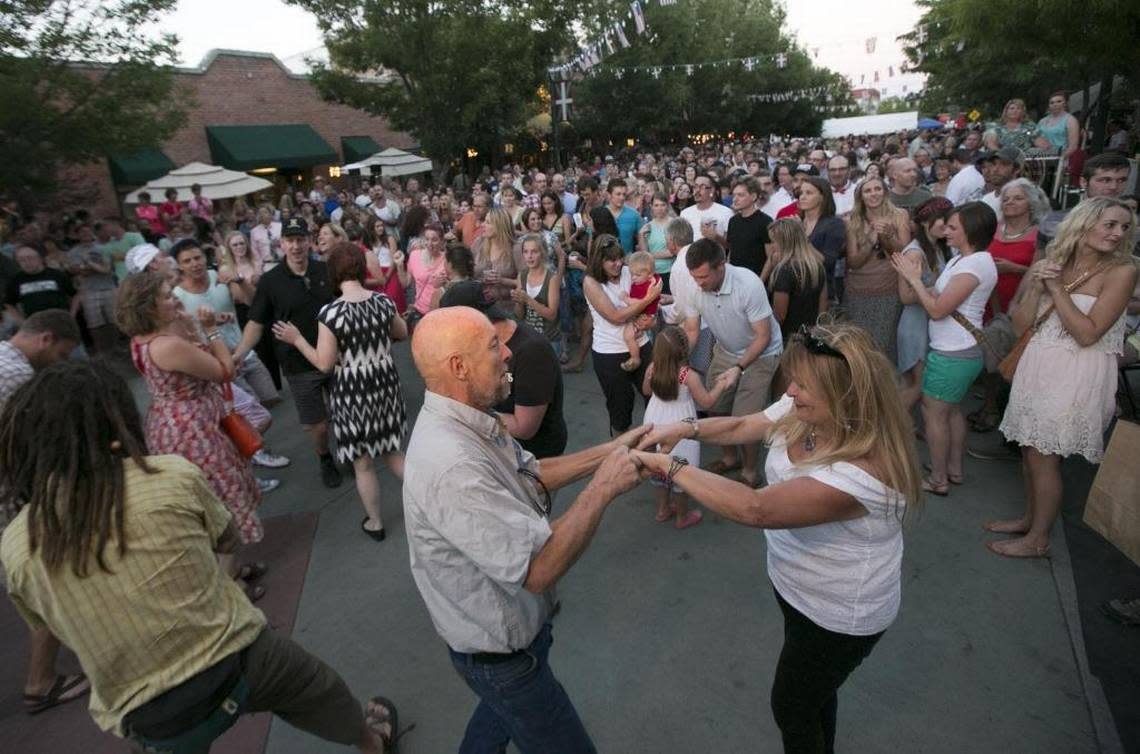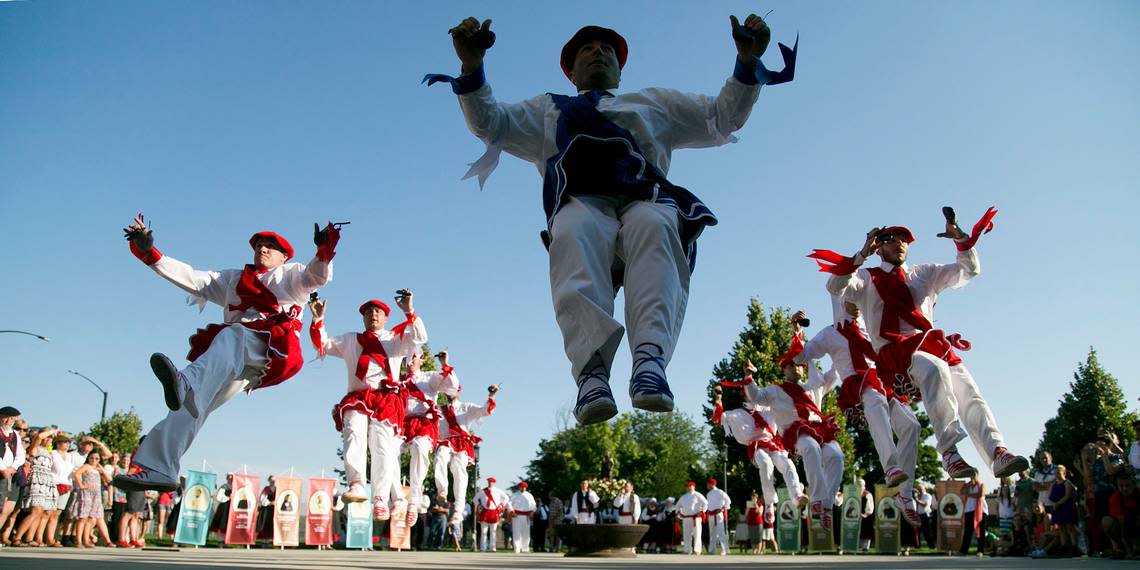This popular Boise festival is back after 2-year hiatus. Come bask in the celebration
After two years of canceled celebrations, Boise’s Basque Block will come alive this weekend with the sights, sounds and smells of northern Spain.
Txantxangorriak musicians will fill the air with the sound of tambourines and accordions, Tolosa Udaberri and Oinkari Basque dancers will fill the streets, and the tastes of chorizo, croquetas and paella will fill the mouths of festival-goers.
It can mean only one thing: The San Inazio Basque Festival is making its long-awaited return.
“We haven’t been able to for the last couple of years because of COVID,” Basque Market owner Tony Eiguren told the Idaho Statesman on Wednesday as he looked over an itinerary taped to the window at his restaurant.
“We’re super excited to be able to see people and kind of get some degree back.”
The Basque Market is one of several restaurants in the Basque Block — Grove Street between 6th Street and Capitol Boulevard — that will play a part in hosting Boise’s largest Basque festival this year.
Leku Ona will be serving food prepared by Basque Country-born chef Asier Garcia, while Bar Gernika, a Basque Block staple since 1991, will be serving up lamb grinders and fried peppers, among other things.
But the festival is more than just an opportunity for some local restaurants to promote their food on a busy weekend. It celebrates decades of Basque culture in Boise, home to the highest concentration of Basque people in the United States.

What is the San Inazio Festival?
Basque Country is an autonomous region in northern Spain — it’s part of the country but has a level of authority within its borders. The Basque community stands out because of its deep cultural roots that are unique to the area, such as its own language, festivals and music.
Basque people began migrating to the western part of the United States in the late 1800s, seeking opportunities for mining, ranching and shepherding. Mass migration to the U.S. started in the mid-1900s, with the Basque fleeing retribution from Spanish general and eventual head of state Francisco Franco, who persecuted and attacked the Basque for refusing to unify with Spain.
Idaho was a popular landing spot for many, as were California and Nevada.
Today, Boise’s Basque Block stands as a cultural stronghold.
“I think it’s really important just to have some kind of cultural center in a city,” Leku Ona general manager Travis Wright told the Statesman. “I mean, we’re in Idaho, right? So it’s not like it’s the most diverse state in the union. And so to have any kind of culture brought in, it’s really nice.”
Boise’s Basque community has been celebrating the San Inazio Festival since the 1950s, said Isana Urquidi, who is on the Euzkaldunak board of directors. Euzkaldunak, a Boise nonprofit, is the organization responsible for hosting the festival.
Each Basque community selects a saint to celebrate each year, and this year Boise chose St. Ignatius of Loyola, the patron saint of the Basque.
“Within the Basque Country, each city kind of has a festival that they’re known for,” Urquidi said. “And many of them are focused around a certain saint and their feast day. So that’s what dictates when (the festival) is.”
St. Ignatius day lands on July 31 every year, so it will be on Sunday, the final day of the festival. St. Ignatius died on July 31, 1556.
What should festival-goers expect?
Urquidi said the Basque Center and local restaurants expect close to 10,000 people to pass through the block over the weekend, even with temperatures exceeding 100 degrees each day.
“You’ll see a big mix of Basque people and people from Boise who just want to kind of participate in the culture,” Urquidi said. “I think the biggest thing probably is just kind of experiencing different aspects of the Basque culture that we have tried to preserve here in Boise.”
Friday
Friday is considered Friends and Family night, Urquidi told the Statesman. The festival will start at 5 p.m. with the traditional Basque sport of Pala and include a “not very formal” night that will see people mingling throughout the block as musicians play in the background.
People will often bring a pintxo, a small appetizer, to the Basque Center and put it on a long table for people to choose from.
Saturday
Saturday is the busiest day of the festival, Bar Gernika owner Jeff May told the Statesman.
Festivities will start at 10 a.m. and the Boiseko Gazteak Basque Dancers — a young dancing group — takes center stage at 11 a.m. Those dancers will be followed by the Txantxangorriak music group, and the Tolosa Udaberri and Oinkari Basque dancers.

“This year is unique in that we have a group from the Basque Country, from the town of Tolosa, and they’ll be visiting and performing with us,” Urquidi said.
There will be a temporary halt in festivities at 7 p.m. for Mass at St. Mark’s Church on Northview Street, where Basque dancers will perform before, during and after. A street dance and musical performance from Amuma Says No will finish the night on the Basque Block at 9 p.m.
Sunday
Sunday is considered “park day,” but the Basque Block will have plenty of activity, too. Much of the day will be spent at Kristin Armstrong Park, where people will set up tables for picnics, and traditional Basque and American park games will be played.
Restaurants will continue to celebrate on the Basque Block. The Basque Market will serve paella in front of the restaurant at 8:15 p.m. It also will have the traditional Spanish and Basque dish once on Friday and four times on Saturday.
The festival will be capped off by a final performance from Amuma Says No at 8 p.m. Sunday.
